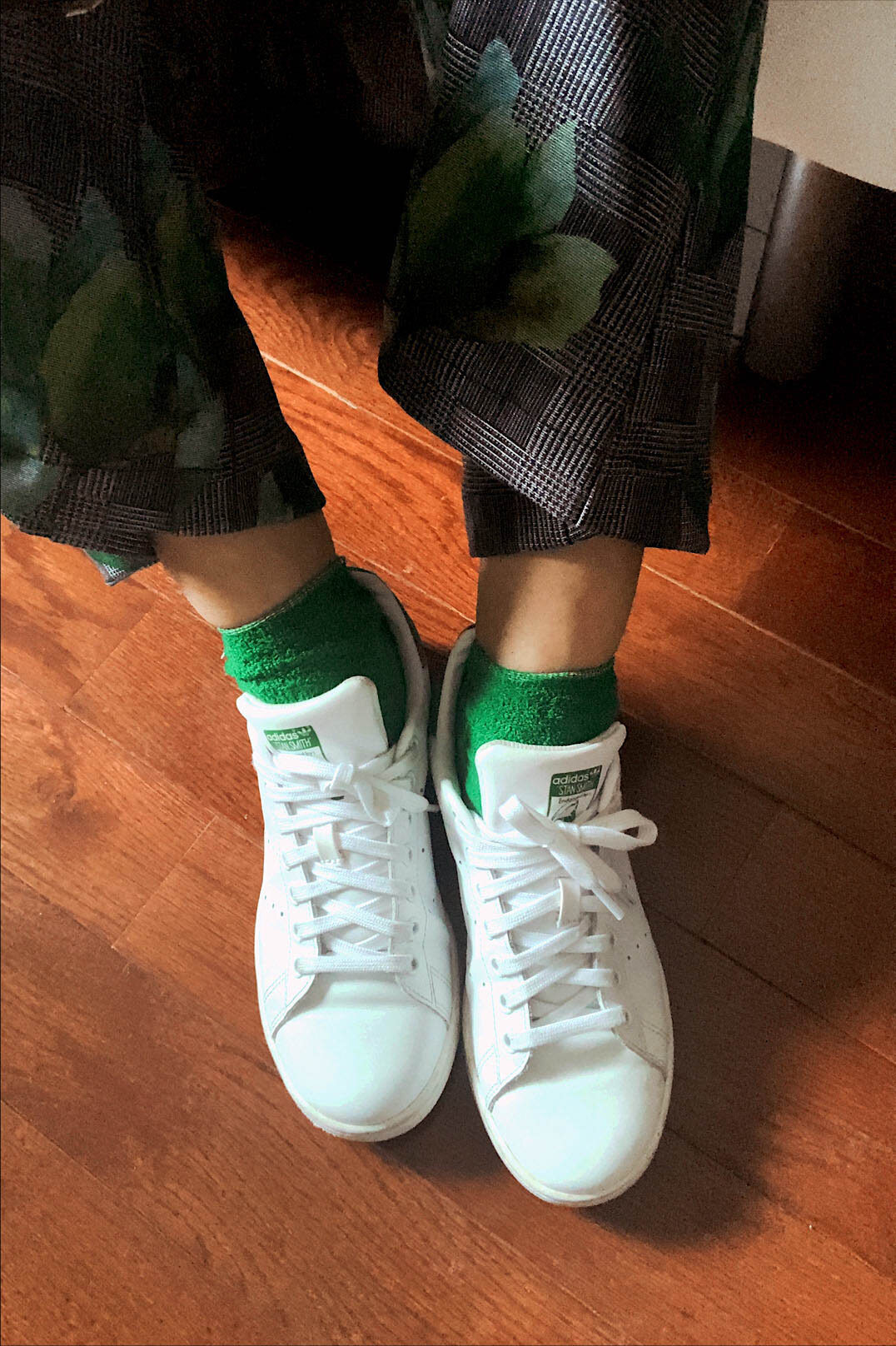April Walker Is One of the Original Streetwear Pioneers
The Future Been Female.
Streetwear as we know it now has its fair share of icons but, very few can say they built it from nothing. Now, as we celebrate Black history, we’re inviting you to meet the woman behind one of it’s legendary brands.
April Walker is our Tommy Hilfiger.
For our February feature, we knew we wanted to do something we’d never done before and we also knew that we wanted to pay homage to someone we’ve been admiring from afar for quite some time. April Walker is hands down one of the reasons we do what we do. She is the culture, she is the history, and her work has left an undeniable mark on women in design.
The late 1980s and '90s are often referenced as the greatest period for fashion in hip hop, as logomania, oversized silhouettes, and all denim everything became the go-to looks for artists making a name for themselves on the scene. Thirty years later and the obsession with the era's hip hop fashion has yet to be quelched. The 'golden era' of hip hop walked hand-in-hand with the rise of “urban” fashion. While we now see a huge rush of Black-owned e-shops popping up every year, Black-owned brands like Dapper Dan, Walker Wear, Karl Kani, Cross Colors, and FUBU were some of the first to see a need in our community and create the clothes of the culture. They were also run exclusively by men — except for one.
Before Tommy Hilfiger jacked the oversized denim look and JNCO started specializing in super large jeans pockets, April Walker crafted the 'Rough and Rugged' suit. You’ve seen it on everyone from Biggie and Tupac to Jay-Z and Aaliyah -- April created it. Catering to the needs of a new generation who were less interested in the bells and whistles and more focused on relaxed fits, deeper pockets, and a pair of jeans that they could rock with their Timbs.
So, when we found out we’d be interviewing one of the visionaries responsible for the bridge between hip-hop, fashion, and Black culture, we kind of had a fangirl moment. Alas, covid has continued to change the way we conduct our interviews so, we opted to meet Ms. Walker in her element: the living room of her Brooklyn home. From the comfort of our FaceTime shoot, we were privy to small glimpses of Walker Wear greatness and that ever-present heartbeat logo. From a strategically placed ring to a t-shirt that speaks volumes, April’s energy is radiant and we stan.
Walker's fashion line devoted itself to dressing hip hop’s up-and-coming artists, who were mostly male. For Walker, moving in musical circles was nothing new. Raised in a musical household (her father was in the music industry, managing Jazz artists in New York), yet as Walker Wear took off, she chose to stay out of the spotlight simply because she knew that a female-led brand wouldn’t succeed in such a male-dominated industry.
Then and Now | Left: Walker at the start of Walker Wear in the early 90’s. Right: Walker at her home in Brooklyn, January 2021.
“I chose to be selectively ignorant when necessary to push forward and make the naysayers become yaysayers. I also was naive to fear and it served me well.” As such, she is both the keeper of a treasure house of hip hop history and a legend herself.
Scenes from that legend have been told and retold under the glow of Brooklyn streetlamps—and increasingly in the mainstream as hip-hop has taken its rightful place in the canon of pop culture and April has stepped forward as one of its most influential voices: How she started her business while still in college with nothing more than her family home and family support. How she was the first woman to open her first custom atelier shop off of Brooklyn’s Greene Avenue in 1988 to sell leather, suede, coats, dresses, and couture outfits, then quickly branched out to a styling division that provided one-of-a-kind outfits for artists. “When we landed our first custom atelier shop “Fashion In Effect”, it was well-received. It took a minute for people to find out about us, but word of mouth was like going viral at that time...We also became a magnet for Hip Hop. Everyone including breakdancers, graffiti artists, hustlers, and rappers would visit our shop, and that was not counting our loyal and hardworking clients that were working 9-5’s.”
And there’s always the Biggie and Tupac references. Always. “When I first met Biggie, he wasn’t yet signed, but we believed in him and he believed in us. It was the same for Tupac. We invested in each other in a sense. Also, we created our designs from the heart. We didn’t worry so much about trends but trusted our instincts and let the product lead the way for us. Thankfully, our styles resonated with our tribe...but if we hadn’t established strong relationships, and if the products weren’t co-signed, it would’ve been a different story. There were so many memories but, two I can remember were when Mike Tyson graced the ring in a heavyweight fight wearing Walker Wear making us the first fashion designer to grace a heavyweight ring, and also when Tupac wore WW in Above The Rim. Priceless memories.”
Yet chapters of April’s legend are still to be written and, if we’re honest, having her here to tell her own story has us feeling incredibly humbled. There’s something about reading the words of someone who has lived life walking in their purpose - it just hits different, especially when you consider just how close she was to giving up. After bigger brands began seeing the success of smaller Black-owned fashion houses like Walker Wear, their designs became replicated and mass-produced with virtually no credit. Much like we’ve seen in many aspects, the big money labels of that time wanted access to Black culture, often without truly including those who helped create it.
Much like we’ve seen in many aspects, the big money labels of that time wanted access to Black culture, often without truly including those who helped create it.
For Ms. Walker, this was a time to bring Walker Wear to an end - until she started her next venture: a consulting company aptly named A. Walker Group.
“A. Walker Group is actually the consulting company that was started to fulfill my creative appetite. I started working with creative brands from footwear to electronics and fashion. It’s funny [because] A.Walker Group actually gave me the confirmation to relaunch Walker Wear, and thankfully, our best year was 2020 in the midst of a pandemic. I’m sure some of that was due to people being more intentional about shopping with Black designers, but it also was a result of the compound effect. We’re grateful for the growth.”
And she isn’t stopping there. Talking to April is kind of like speaking to an older and wiser sister or mentor. Someone who exudes a desire to help others see further and offers up her wisdom without hesitation. “As part of my legacy, I want to help build a healthier fashion ecosystem to ensure the future Black and brown designers, so they don’t endure some of the invisible challenges we encountered on our rise.” Her desire to give to younger generations can also be seen in her philanthropic efforts. Walker presently teaches a workshop for high school scholars called #BYOB (Be Your Own Brand). She’s also a contributor and scholarship provider for the Parsons x Complex virtual “Streetwear Essentials” course which allows students to explore all aspects of the streetwear industry, discover related careers, and build their skills.
April Walker, circa 2021. Photo: Katie Charlesworth for CNK Daily
Now into Walker Wear’s 33rd year, Walker is at ease with change and still reinventing herself. A book, aptly titled “Walker Gems: Get Your A$% Off The Couch”, was published in 2017. She has every intention of continuing to push for change in fashion and, more importantly, for us to recognize our power: “I’d like to see more equity for designers of color, more diversity within fashion, from an executive level and in the board rooms. Color it up and make sure women are represented as well. I’d like to see more resources and opportunities offered to brown and Black designers, and I’d like Black and brown consumers to understand the power of their dollars.”
Spoken like a true boss.
To see more from April and shop the Walker Wear collection now, tap below. Many thanks to Ms. Walker for allowing us into her space and for helping us share her story.
Retro Images courtesy of Walker Wear
This interview has been edited and condensed for clarity.
Written By: Channing Beumer
Photographer: Katherine Charlesworth









